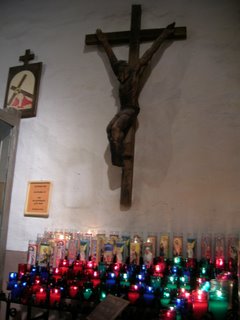This Lent I’ve been rereading Richard John Neuhaus's
Death on a Friday Afternoon. The book is an extended reflection on the Seven Last Words of Christ. In the 3rd chapter, Neuhaus writes about Christ’s words to Mary and John: “Woman, behold your son . . . behold your mother.” He writes, among other things, about Mary’s presence at the cross, her participation in his suffering:
“Stabat mater dolorsa. At the cross her station keeping. There was nothing else to be done, except to be there. The presence of our helplessness is our gift to the helpless.”
The last sentence particularly struck me. Last week I read Connie Willis’
Doomsday Book. It's the story of a young girl, a history student at a future Oxford, who travels back in time to study the 14th century. Due to an error in calculations, she ends up in the wrong year—coming to know and love the people only to watch them die of the bubonic plague. Kivrin does everything she can to save them . . . and fails.
The book doesn’t skimp on the unpleasant details, and it doesn’t offer easy answers. The reader, along with Kivrin, becomes immersed in the lives of a Medieval family, hoping desperately that at least some of them will survive, will recover from the horrible illness. All her efforts seem utterly wasted, and for Kivrin and the reader alike the futility is almost unbearable.
Yet, without even realizing it, Kivrin makes a difference. Her unflinching love, her willingness to suffer with and for these people, keeps the village priest from despair, reassuring him that, in spite of all appearances, God has not abandoned them. He thinks Kivrin is a saint sent to them from Heaven. This revelation strikes one at first as a pitiable mistake, his faith false and foolish. After all, we know that Kivrin isn’t a saint sent from Heaven by God, but a history student sent from Oxford by a technician with the flu. A technician who made a mistake.
But--do we know that? Willis quietly suggests that we don't. God may have sent her all the same . . . allowing the mistake in calculations so that Kivrin (or Christ through Kivrin) could offer grace in the darkness of 1348. Not by performing a miracle, not by saving lives, but by suffering with them, by offering her helplessness as a gift.
“It is precisely in the darkness of abandonment that God’s power shines through our human weakness,” Neuhaus says. As it shone through Christ, when he experienced the most devastating human weakness, when he died on a Friday afternoon,—when he, in Neuhaus’s words, abandoned himself to God even as God abandoned him.
More than once, I’ve seen people withdraw from others who were suffering because they didn’t know what to do or how to help. More than once, I have been those people. And perhaps all they needed, perhaps all God wanted me to offer them, was my helplessness.


